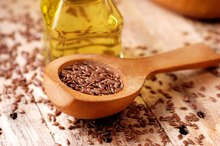Histamines & Acne
Acne, long thought of as a problem exclusive to adolescents, also affects males and females of all ages. Your body produces histamine as a protective device against allergens. Although acne and skin eruptions caused by allergies may appear similar, acne is not a response to histamines.
Histamines and Allergens
Histamine is an inflammatory chemical that your body produces as a result of coming into contact with an allergen. Your immune system’s release of histamine during an allergic reaction can cause a variety of eruptions on the surface of your skin, such as hives and angioedema. Like hives and angiodema, acne is a type of skin eruption; however, acne is not produced due to a release of histamine during an allergic reaction.
Acne Causes
Corn Allergies & Acne
Learn More
Acne is a type of skin eruption that occurs as a result of excess production of oil, also known as sebum. Increased production of sebum is not a side effect of an allergen, but rather, it is a response to hormonal imbalance or bacteria buildup. Certain medications, especially those that affect your hormones, can also cause acne. When your body produces excess amounts of oil, the oil may obstruct your hair follicles and form acne. There are several kinds of acne: pimples, whiteheads, blackheads and cysts. All four types of acne begin to develop as the result of oil and dead skin cells blocking hair follicles.
- Acne is a type of skin eruption that occurs as a result of excess production of oil, also known as sebum.
- All four types of acne begin to develop as the result of oil and dead skin cells blocking hair follicles.
Skin Eruptions and Allergies
Hives and angioedema occur because of a release of histamine during an allergic reaction 1. As part of your immune system, mast cells release histamine into your bloodstream when signaled that your body has come into contact with an allergen. Histamine causes your blood vessels to swell, which results in a skin eruption. Hives are a type of histamine-induced skin eruption characterized by itchy red welts; angioedema is a type of histamine-induced skin eruption that is characterized by deep tissue swelling, especially around the eyes and lips.
- Hives and angioedema occur because of a release of histamine during an allergic reaction 1.
Prevention
Exercise & Histamines
Learn More
To help prevent histamine-induced skin eruptions, it is important to avoid contact with the allergen. Hives and angioedema are most often caused by an allergy to certain foods, medications, and/or substances, such as:
- latex
- pollen or animal dander.Treatment of acne generally involves using a topical ointment or taking an oral medication
Acne treatment aims to slow production of oil, combat bacteria, and stabilize your hormones.
Related Articles
References
- University of Maryland Medical Center -- Angioedema
- Kraft J, Freiman A. Management of acne. CMAJ. 2011;183(7):E430-5. doi:10.1503/cmaj.090374
- Sutaria AH, Masood S, Schlessinger J. Acne Vulgaris. [Updated 2019 Dec 13]. In: StatPearls [Internet]. Treasure Island (FL): StatPearls Publishing; 2019 Jan-. Available from: https://www.ncbi.nlm.nih.gov/books/NBK459173/
- American Academy of Dermatology. WHAT CAN CLEAR SEVERE ACNE?
- Cleveland Clinic. Rosacea (Adult Acne). Last reviewed October 10, 2019.
- American Academy of Dermatology. IS SPORTS EQUIPMENT CAUSING YOUR ACNE?
- American Academy of Dermatology. I HAVE ACNE! IS IT OKAY TO WEAR MAKEUP?
- Zaenglein AL, Pathy AL, Schlosser BJ, Alikhan A, Baldwin HE, et. al. "Guidelines of Care for the Management of Acne Vulgaris." Journal of the American Academy of Dermatology; 2016. 74(5):945-73.
Writer Bio
Kathryn Gilhuly is a wellness coach based in San Diego. She helps doctors, nurses and other professionals implement lifestyle changes that focus on a healthy diet and exercise. Gilhuly holds a Master of Science in health, nutrition and exercise from North Dakota State University.








